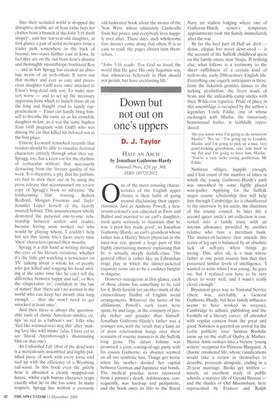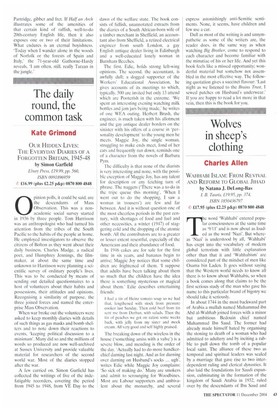Down but not out on one's uppers
D. J. Taylor
HALF AN ARCH by Jonathan Gathorne-Hardy Timewell Press, £20, pp. 368, ISBN 1857252012 0 ne of the more amusing characteristics of the English upper classes is their habit of going around disclaiming their upperclassness. Just as Anthony Powell, a lieutenant-colonel's son educated at Eton and Balliol and married to an earl's daughter, used quite seriously to maintain that he was 'a poor boy made good', so Jonathan Gathorne-Hardy, an earl's grandson whose father was a Harley Street physician in the inter-war era, spends a large part of this highly entertaining memoir explaining that he is actually deeply middle-class. The general effect is rather like an Edwardian stage play in which the dinner-jacketed exquisite turns out to be a cockney burglar in disguise.
However outrageous at first glance, each of these claims has something to be said for it. Both furnish yet another mark of the extraordinary fluidity of English social arrangements. Whatever the lustre of his affiliations, Powell's early years were spent, by and large, in the company of people richer and grander than himself. Jonathan Gathorne-Hardy's father was a younger son, with the result that a faint air of poor relationdom hangs over these accounts of roseate summers in the Suffolk long grass. The infant Johnny was promised a joint coming-of-age party with his cousin Gathorne: its absence seemed an all too symbolic loss. Things got worse when his mother divided her capital between German and Japanese war bonds. The medical practice never recovered from a partner's death. Adolescence, consequently, was hard-up and peripatetic, and the book owes its title to the Royal Navy air station lodging where one of Gathorne-Hardy senior's temporary appointments took the family immediately after the war.
By far the best part of Half an Arch — dense, elegiac but never dewy-eyed — is the account of the Suffolk childhood spent on the family estate near Snape. If nothing else, what follows is a testimony to the sheer raffishness of a certain kind of well-to-do, early-20th-century English life. Everything one eagerly anticipates is there, from the lickerish grandes dames to the lurking alcoholism, the livers made of brass and the unfeasibly camp uncles with their Wilde-era repartee. Pride of place in this assemblage is occupied by the author's legendary Uncle Eddie, one of whose exchanges with Maslin, the timorously homosexual butler, is faithfully reproduced:
'Do you know what I'm going to do tomorrow Maslin?"No, sir.' I'm going up to London, Maslin, and I'm going to pick up a nice, very good-looking guardsman, take him back to my flat and I'm going to have him, Maslin.' 'You're a very lucky young gentleman, Mr Eddie.'
Noblesse obliges, happily enough, and 1 lost count of the number of times in which the young Gathorne-Hardy's path was smoothed by some highly placed wire-puller. Applying for the Suffolk major county scholarship that will help him through Cambridge, he is chauffeured to the interview by his uncle, the chairman of the county council. In later life a second queer uncle's art collection is converted into a family trust, with an interim allowance provided by another relative who runs a merchant bank. The matter-of-factness that attends this series of leg-ups is balanced by an absolute lack of self-pity when things go wrong. This, after all, is a man whose father at one point assures him that they possessed similar levels of intelligence. 'I wanted to write when I was young,' he goes on, tut I realised you have to be very clever to write well, and I wasn't really clever enough.'
Bryanston gives way to National Service (there was, inevitably, a General Gathorne-Hardy, but here family influence seems to have worked in reverse), Cambridge to adland, publishing and the foothills of a literary career, all attended with regular cameos from the great and good: Nabokov is greeted on arrival for the Lolita publicity tour; Salman Rushdie turns up on the staff of Ogilvy & Mather; Martin Amis sashays into a bizarre 'young writers' reception for Princess Margaret. A chaotic emotional life, whose ramifications would take a review in themselves to describe, proceeds alongside, ending in a 20-year marriage. Books get written — novels, an excellent study of public schools, a massive life of Gerald Brenan — and the shades of Old Bloomsbury, here represented by Frances and Ralph
Partridge, gibber and fret. If Half an Arch illustrates some of the amenities of that certain kind of raffish, well-to-do 20th-century English life, then it also exposes one or two of their limitations. What endures is an eternal boyishness. 'Today when I wander alone in the woods of Norfolk or the forests of Spain and Italy,' the 71-year-old Gathorne-Hardy reveals, 'I am often, still, really Tarzan in the jungle.'











































































 Previous page
Previous page